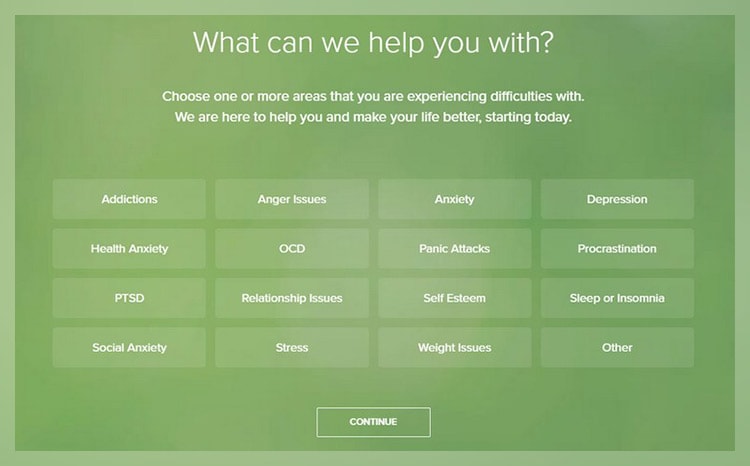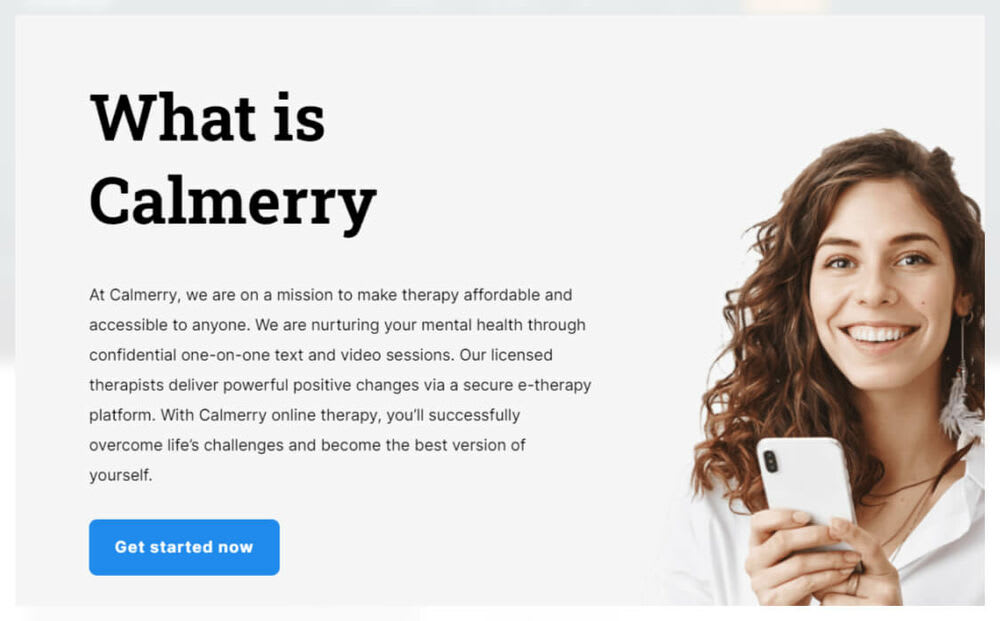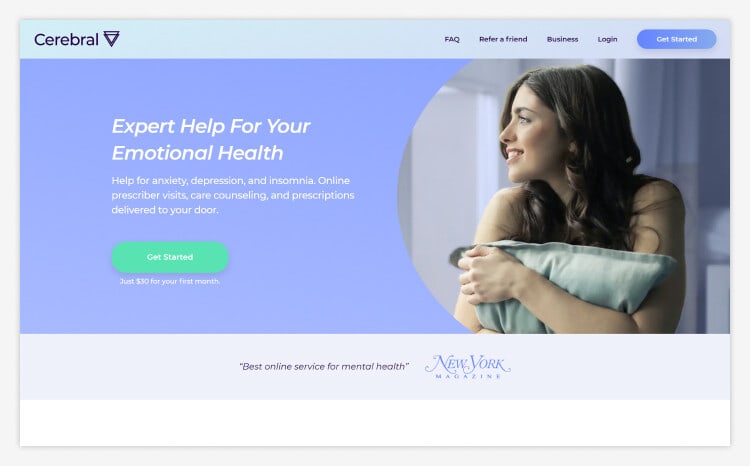What Is Online Therapy and What Makes It a Viable Alternative to In-Person Therapy?
Online therapy is a virtual version of traditional, in-person psychotherapy. Online counselors use the same interventions as in-person providers, including CBT, dialectical behavior therapy (DBT), online trauma therapy services , and talk therapy.
According to a 2022 depression research and treatment meta-analysis by social worker Carly M. Charron and epidemiologist Kevin M. Gorey, e-therapy programs—especially involving video calls—can be just as effective as in-person treatment.
Online therapy is also a more accessible option for those who cannot afford traditional psychotherapy, struggle to commute to appointments, or are concerned about the perceived stigma of being seen entering a psychotherapist's office.
Exploring the Basics: How Online Therapy Work?
To start, you answer a few demographic questions, specify which mental health issues you need support with, get screened for depression and suicidality, and state which characteristics you want in a counselor.
Depending on the platform, this data is analyzed by either an algorithm or a real person. You are then matched with a web therapist aligned with your preferences and trained to treat your specific mental health concerns.
From there, the online therapy program process unfolds as it would in person. You meet with a therapist for about 45-55 minutes weekly to discuss a personal difficulty, gain insight into its origins and impact on your life, and practice tools to help you address it.
These tools can include emotion regulation techniques, communication skills, and strategies to identify and change troublesome thoughts and behaviors.
Phone, Video, or Chat: Choosing the Best Format for Online Therapy
A 2020 psychophysiology study by Jonne O. Hietanen showed that eye contact over video calls evokes physiological arousal levels comparable to those in in-person interactions. Being able to observe your therapist's body language, facial expressions, and eye contact—and allowing them to do the same—may be more engaging for both of you.
However, some clients may prefer a phone or text due to concerns like poor internet connections, schedules that preclude them from sitting in front of a camera, or simply because these options may be cheaper.
According to a 2022 Current Psychiatry Reports research review spearheaded by Patricia V. Chen, phone therapy is effective in treating many mental health conditions, so rest assured that this option is equally viable.
Plus, a 2022 Frontiers in Psychiatry research review led by Reham Shalaby showed that chat support is particularly helpful for individuals with addiction and psychosis, and can reduce symptoms of anxiety and depression.
Benefits of Online Therapy: Why Choose This Approach?
Online therapy is convenient, flexible, and cheaper than in-person therapy, especially with a subscription plan. No commuting is necessary, so those who are homebound or have limited mobility can meet with a therapist from the comfort of their homes, making it much more feasible than in-person therapy for those who are looking for better health care options.
With online counseling, people also don't have to worry about being "seen" coming and going from a therapist's office, which helps avoid potential perceptions of stigma.
Who Can Benefit from Online Therapy?
Online therapy is ideal—and can greatly benefit—those who:
Experience mild-to-moderate symptoms: Patients who struggle with anxiety, depression, stress management, and relationship difficulties are all equally suitable for virtual counseling.
Have a busy lifestyle or live far from in-person therapy options: Online counseling allows for remote and on-the-go support, which helps if you don't have time to commute to sessions.
Have an insurance plan that doesn’t cover therapy or doesn't have insurance at all: Online therapy is often more affordable than in-person therapy, making it more accessible even to those without insurance options.
Enjoy extra communication features: Virtual therapy platforms can offer text messaging, phone calls, and learning modules in addition to therapy sessions.
Are ready and willing to engage in therapy: The key to reaping the benefits of online and offline therapy is readiness and willingness to engage, which has been shown to predict better treatment outcomes by a 2017 BMC Psychiatry study, led by psychologist Henning Krampe.
Considerations of Online Therapy: Who May Not Benefit?
Online therapy may not be beneficial for anyone who:
In an acute mental health crisis or experiencing severe symptoms: Patients experiencing extreme symptoms of psychosis, anorexia, bulimia, or mood disorders are not suitable candidates for online talk therapy. These conditions typically require higher levels of care, such as hospitalization or intensive outpatient programs, which internet therapy does not offer.
It is court-mandated for mental health services: Individuals who are court-mandated for treatment may not be suitable for e-therapy, since therapists are required to complete paperwork that online platforms may not be equipped to process.
Prefer face-to-face interaction: Online therapy sessions are not face-to-face by design, so it may not be as beneficial to those who like to interact with their therapist in person.
How Much Does Online Therapy Cost?
Online therapy can range from $60 to $200 per session. This depends on the platform, subscription plan, and type of therapy you choose. Some services include medication management and psychotherapy in their plans, which can affect the total cost. Whether you see a provider via video, phone, or chat can also impact the final pricing.
Many online platforms such as Thriveworks, Cerebral, Talkspace, and Amwell also accept insurance, which helps offset the cost.
Free Online Therapy Services: Availability and Limitations
While you'll be hard-pressed to find free online counseling services, there are several online supportive mental health services that offer help during an emergency.
These include crisis lines with text and chat features like the National Suicide Prevention Lifeline Chat and
Text service. The National Alliance on Mental Illness (NAMI) also offers free online support groups.
Saving with Online Therapy: Financial Benefits to Consider
A 2022
survey conducted by Zencare found that the average cost of therapy in the United States is $182 per session, with higher rates depending on the state.
That's at least $728 a month, which doesn't account for the costs of commuting or potential lost income due to time spent in the session or commuting.
In contrast, most virtual therapy sessions conducted via affordable online therapy platforms are under $100, billed on a weekly or monthly basis, according to users' subscription plans.
That small amount often includes additional features, like worksheets, educational content, and unlimited texting with a therapist, which aren't often included with in-person therapy.
Unlimited Sessions and Flexible Communication Options
Unlike in-person therapy, which restricts therapeutic interactions in face-to-face formats, online therapy platforms allow clients to see and speak with their therapists via video conferencing software, phone calls, text messages, and chat functions. Most platforms also allow unlimited text messaging with a therapist outside regular sessions.
Reduced Commuting Costs and Time
Average gas prices in America continue to hover above $3.40, according to AAA.com, which means that driving to a therapist's office adds a substantial amount to in-person therapy's true monthly cost—as do tolls and parking fees.
Choosing the Right Online Therapy Service in 2025
To ensure you get the best outcomes from virtual therapy to achieve better health, it's important to find the right online counseling service for you. Consider the following key factors to help you decide which is the best fit:
- Services offered: Opt for platforms with modalities that appeal to you, like Cognitive Behavioral Therapy, DBT, mindfulness-based stress reduction (MBSR), faith-based therapy like Christian counseling, couples therapy, or affirmative therapy. Also, consider whether you need a provider who can prescribe medication.
- Features: Take a closer look at the platform's additional features to see which best suits your personalized therapy needs. Consider the resources you'd access in addition to therapy—like courses, digital worksheets, and mood and progress trackers. For example, Calmerry offers some helpful tracking tools, and Online-Therapy.com offers yoga classes.
- Cost: Think about how much you're willing to pay for your mental health care, as it's not all online therapy platforms cost the same. For example, Online-Therapy.com offers services for as low as $40 per week, while Cerebral, Amwell, Thriveworks, and Talkspace's medication and therapy services range from $99 to over $200 per month if insurance isn't an option.
- Ease of use: The usability of online therapy platforms and mental health apps impacts whether they're perceived as helpful, as researcher Amy Hai Yan Chan found in a 2021 Journal of Psychiatric and Mental Health Nursing review. If one platform doesn't feel comfortable, engaging, or feasible enough for you to use, consider another that offers a more user-friendly experience.
Finding the Right Therapist for You
It's important to know what each kind of therapist's credentials mean, so you can see what they'll be able to help you with.
Here's a look at five of the most common kinds of therapists:
Psychiatrist (MD)
A psychiatrist has a medical degree—hence the "MD." This means they're well-versed in biological systems and will incorporate an understanding of the brain and body's biochemistry into their therapy sessions. Psychiatrists are the only kind of therapist on this list able to prescribe medication.
Psychologist (PsyD, PhD)
A psychologist holds a doctoral degree, meaning they've had between four and eight rigorous years of post-secondary education. PsyDs receive extensive training in clinical work with clients, while PhDs participate in research during their post-secondary education.
Licensed Professional Counselor (LPC)
LPCs complete two-year, master-level programs in mental health counseling and psychotherapy. They may specialize in psychological testing and diagnosis, and they've likely completed additional, post-master's degree training in specific psychotherapy modalities like CBT, DBT, and acceptance and commitment therapy (ACT).
Licensed Marriage and Family Therapist (LMFT)
LMFTs undergo two-year, master-level programs with a specific focus on marriage and family therapy, meaning they're most adept at supporting individuals, couples, and families with relationship or interpersonal difficulties. They may undergo additional post-master's degree training that prepares them to work with specific demographics of people and conditions.
Licensed Clinical Social Worker (LCSW)
To be licensed at the clinical level, social workers must complete a two-year master-level program, demonstrate three years of supervised client-facing work, and pass a four-hour licensing exam.
Social workers are trained in a strength-based approach, meaning they elicit clients' inherent coping skills, abilities, and competencies rather than just focusing on deficits or diagnoses. Plus, they're ethically obligated to serve vulnerable and oppressed populations.
They're also versed in the "systems" approach to clinical work, meaning they view symptoms in light of the environment (familial, institutional, political) in which clients live, work, and socialize.
Like other licensed mental health professionals, social workers often undergo additional post-master's degree training to treat specific conditions like mood disorders, schizophrenia, anxiety, panic disorder, post-traumatic stress disorder (PTSD), and OCD.
Common Treatment Fields in Online Therapy
Many therapists offer a range of modalities, including CBT, DBT, MBSR, and ACT—to name just a few. Here's a closer look at the main online therapy treatment fields on your journey to better health:
Couples Counseling
Online couples therapy involves spouses or partners grappling with difficulties such as communication, infidelity, possible separation, conflict, sexual dissatisfaction, financial challenges, growing apart, or simply struggling to adjust to major life events like becoming a parent, experiencing infertility, or losing a child.
An online couples therapist helps both partners better understand each other's perspectives, facilitates healthy communication, and supports the practice of coping skills that help their relationship heal.
Teen Therapy
Therapy for teens addresses the concerns and challenges of navigating that tricky time period between puberty and young adulthood. Online therapists specializing in this type of treatment are versed in early developmental milestones and specifically support teenagers in coping with bullying, peer pressure, family conflict, academic stress, and struggles with friendships and early romantic relationships.
Teen therapy can sometimes involve play therapy, whereby teens engage in games or activities that help them develop stronger bonds with their therapist and more readily express their true thoughts and feelings.
LGBTQ+ Support
LGBTQ+ online therapy aims to affirm and accept non-heterosexual individuals' gender identities and sexual orientations in light of their unique concerns, stressors, and needs.
Specifically, LGBTQ+ therapist specialists work with their clients through issues of discrimination and violence, community building, self-acceptance, and reducing perceptions of shame or guilt about their sexuality.
Anxiety Treatment
Online therapy for anxiety targets the thought process, giving rise to anxious feelings and behaviors, and supports individuals in practicing emotion regulation and mindfulness techniques that help reduce anxiety.
Many online therapists also help clients gain insight into why specific triggers—people, places, or things—elicit anxiety to help them better overcome it.
Depression Therapy
Online depression counseling and online therapy for
depression help clients identify and challenge detrimental beliefs and thoughts like, "I'm a failure," or "I'll be miserable no matter what I do."
It further supports clients in building activities into their schedule that increase energy and elicit more motivation and positivity—a tactic called behavioral activation.
Bipolar Disorder Management
Effective online therapy for clients with bipolar disorder involves exploring the onset and course of symptoms, educating patients about the illness, and imparting emotion regulation skills.
Online therapists who treat bipolar disorder help clients identify and devise safety plans in anticipation of early signs of increasing mania, hypomania, or depression. Additionally, they often coordinate with prescribers to support clients' adherence to medication plans.
OCD Treatment
Symptoms of OCD include intrusive and unwanted thoughts that are often accompanied by ritualistic behaviors aimed to reduce or eliminate those thoughts.
Online therapy for OCD typically involves CBT and exposure therapy, which gradually increases real or imagined exposure to OCD triggers, while practicing techniques to enhance tolerance like deep breathing, visualization, and mindfulness interventions.
ACT, which seeks to increase cognitive flexibility and the pursuit of value-oriented behavior, has also been shown to enhance
the outcomes of standard OCD treatments.
5 Tips for Preparing for an Online Therapy Session
To maximize the benefits of your online therapy sessions and work towards better health for your mental well-being, you should know how to prepare for them. Keep these tips in mind:
1. Minimize Environmental Distractions
Distractions disrupt the therapeutic process and can interfere with your ability to learn new skills and make critical connections between past experiences and present behavior. Try turning on a white noise machine or fan to drown out background noise, or use headphones during sessions.
2. Have a Backup Internet Connection Plan
Poor video quality, frozen video, or internet connection drops can disrupt and interfere with the quality of therapy you receive. Have a backup plan for when an internet connection fails or weakens. This could include ensuring your therapist has your phone number to continue sessions via telephone, using the "mobile hotspot" option on your smartphone or securing a location with consistent WiFi.
3. Be Present and Engaged During Sessions
It may seem more convenient to do virtual therapy from home or work to take care of tasks like checking email, folding laundry, putting away the dishes, etc. But by not focusing entirely on your therapy session, you're more likely to miss key insights and opportunities to practice skills that help you.
4. Prepare Talking Points and Discussion Topics
Keep track of situations between therapy sessions that you need support processing so you can dive into them once your session begins. When we log on from home or work, and don't have to sit and reflect in a waiting room, we may not remember important challenges from our week. However, jotting them down in a notebook or device keeps us accountable and gives an online therapist more opportunity and time to assist where we need it most.
Is Online Therapy Regulated?
Online therapy is regulated to the extent that the specific service providers on online platforms are regulated—and such regulations may vary by state. Generally speaking, to provide psychotherapy to a client, a clinician must be licensed in the state where the therapy is taking place.
The exception to this is when clients disclose a clear intent to harm themselves or someone else. In this situation, appropriate authorities and individuals, such as the police, other providers, or potential victims, may be contacted.
Which Mental Health Issues Can Be Treated With Online Therapy?
In addition to OCD, depression, anxiety, and bipolar disorder, virtual therapy and online counseling services can address the following mental health conditions:
PTSD
A 2007 BMC Psychiatry study led by researcher Christine Knaevelsrud found that clients with PTSD saw significant symptom improvement after working with a virtually licensed therapist.
This involved patients recalling and reprocessing traumatic memories and then reflecting on them, and correcting their dysfunctional beliefs and feelings of guilt and shame.
Insomnia
Danish researchers overseen by psychologist Mia S. O'Toole noted that internet-delivered cognitive behavioral therapy for insomnia (CBT-I) is effective in improving sleep quality and total sleep time.
Borderline Personality Disorder
A 2021 JMIR Mental Health review overseen by psychologist Margo Rivera found that online therapy involving DBT skills training and education improved borderline personality disordered clients' emotional regulation and reduced how often they fought or argued with others.
Burnout
Researcher Jung-Hyun Park and colleagues observed in their 2022 systematic review that online interventions encouraging the emotional freedom technique (EFT) reduced symptoms of burnout among nurses. EFT involves the systematic tapping of specific areas of the body, head, and face while focusing on a stressor.
Additionally, a 2012 PLOS ONE study overseen by psychologist Paul Emmelkamp revealed significant improvements in burnout symptoms among 1,500 clients receiving online CBT.
Eating disorders
Online CBT was found to reduce episodes of excessive eating and depression symptoms among 63 enrolled patients with binge eating disorder in a 2021 European Eating Disorders Review paper. Psychologist Marilena Maglia and colleagues also learned that online therapy is effective across multiple studies in reducing eating disorder symptoms among adolescents.
Additional Online Therapy Sites Reviewed
In addition to the top online therapy services for better health outlined above, we've reviewed other companies that provide the same or similar services. If you're looking for more options, read our full reviews here:
JustAnswer - Best for people who aren't ready for regular therapy
Brightside - Best for insured individuals struggling with anxiety and depression
PrestoExperts - Best for paying a therapist by the minute rather than monthly
We Thought You Might Find These Articles Interesting:
Online Therapy in 2025: A Worthwhile Investment
Virtual therapy companies provide affordable alternatives to in-person therapy with comparable quality of care and outcomes.
Our picks for the top 10 best online therapy sites and platforms are Betterhelp, Cerebral, Online-Therapy.com, Thriveworks, ReGain, Teen Counseling, Pride Counseling, Talkspace, Calmerry, and Amwell.
Each platform offers unique features, various ways to connect with your therapist, and useful services like educational content and medication management. Several online
therapy services even take insurance, cutting costs further.
Online counseling options may seem limitless, but remember what's most important to you. Take note of what feels helpful and what doesn't to find the best telehealth service with the right therapist, platform, and course of treatment that suits your individual needs.
As a general rule, yes, e-therapy is cheaper than in-person therapy. Online therapy averages $60 to $80 per weekly session, while in-person therapy typically costs $100 to $200 per session.
There is growing scientific evidence that online therapy is legitimate and effective, with similar outcomes to in-person therapy and numerous benefits for patients and practitioners.
The best internet therapy platforms adhere to strict health regulations and employ sophisticated technological defense for chats and voice or video calls. However, some providers are known to share de-identified information with third parties like Facebook and Google, so be sure to read policies carefully and do some research online.
For many people and many mental health issues, yes. Online therapy has been shown to be just as effective as in-person therapy in treating a wide variety of mental health issues, including depression, anxiety, and addiction. It is not recommended for more serious mental health issues, like severe depression, schizophrenia, or for situations where the patient is likely to harm themselves or others.
Your choice of online therapy may be covered depending on your insurance company. Some virtual therapy sites and apps already have agreements set with insurance companies. If your insurance company doesn’t cover e-therapy, you can always try to get a reimbursement.
Some internet therapy providers like Cerebral and MDLive are covered by Medicare. Call the customer service of a virtual counseling center and ask if they take Medicare, or inquire through Medicare itself.
Online therapists can’t prescribe medications because they might not have the proper accreditations to do so. Only a psychiatrist, someone who is a medical doctor, can prescribe medicine. Psychiatrists can do this both online and in person, but they can’t give medicine for chronic illnesses that require physical examinations.
Natural Intelligence does not provide medical advice, diagnosis, or treatment. If you think you may have a medical emergency, call your doctor or your local emergency number immediately.





.20210808104248.png)









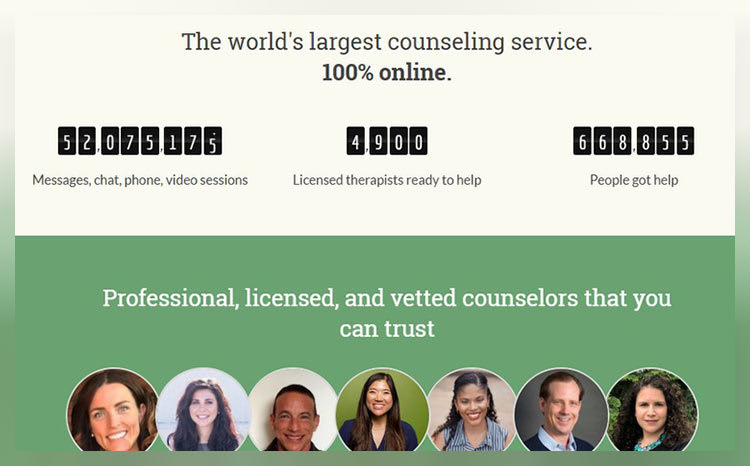

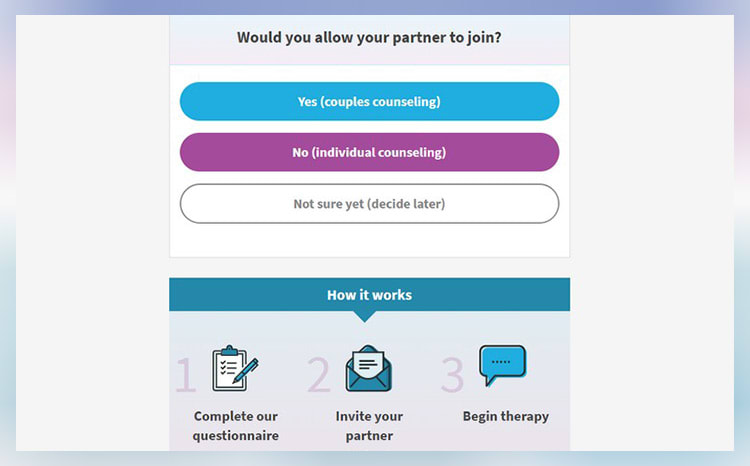



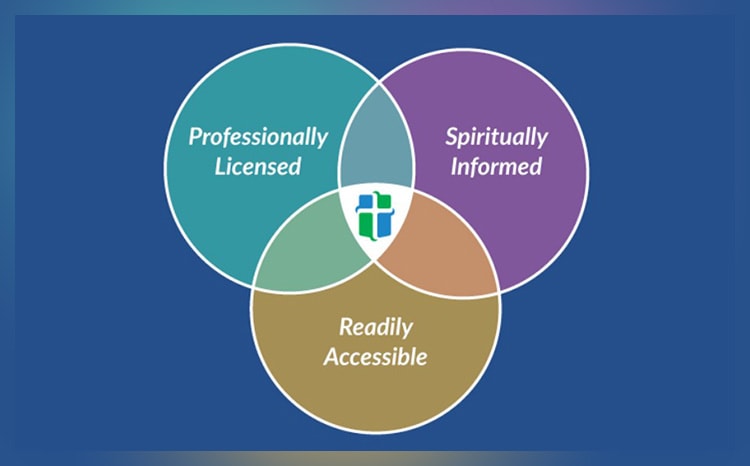
.20210808104248.png)
